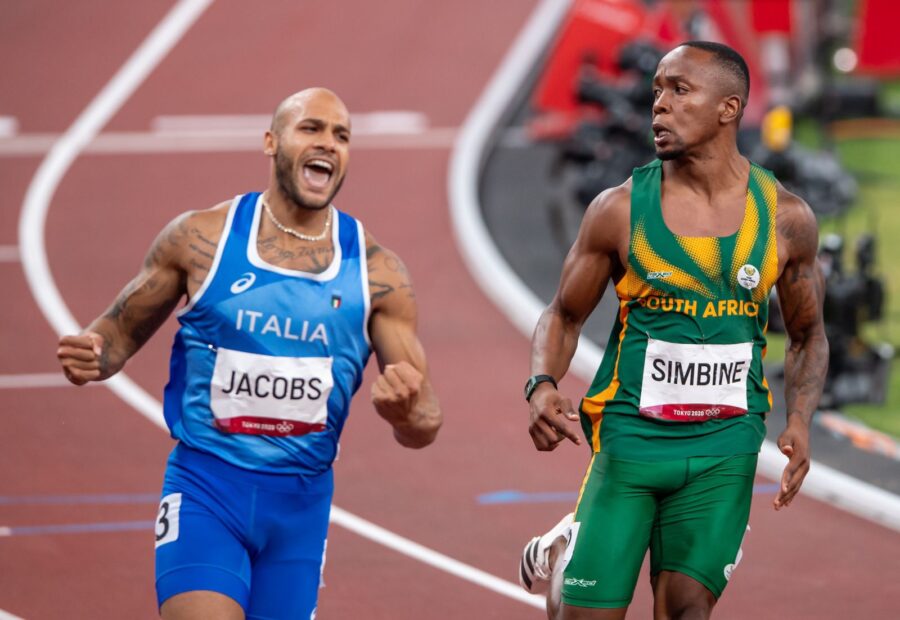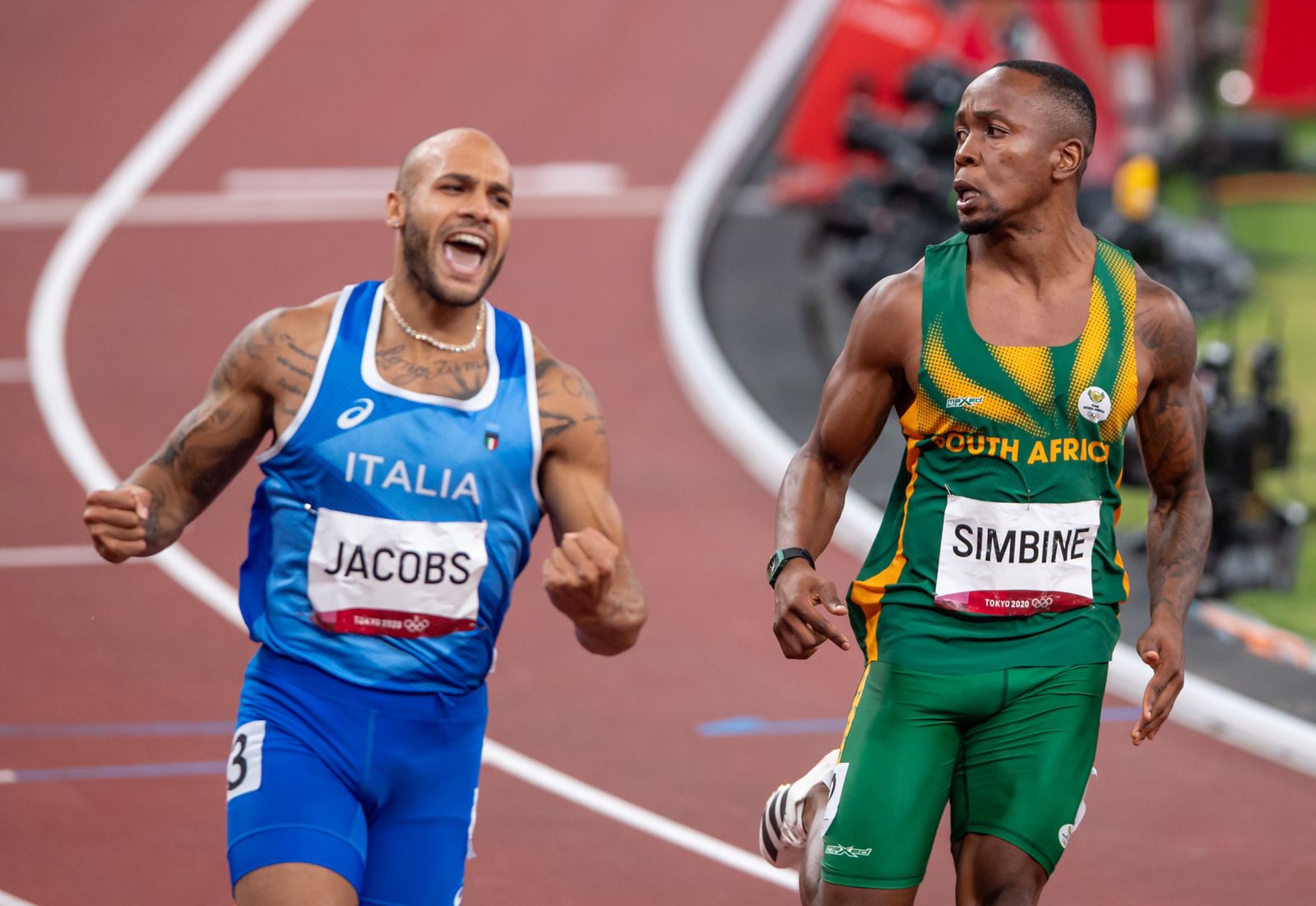
Akani Simbine Comes Close But Forced to Settle for Fourth Place at Olympics
Four-hundredths of a second, how quick is that? Literally the blink of an eye? And that’s what separated Akani Simbine from winning a medal at the Tokyo 2020 Olympics… writes GARY LEMKE in Tokyo. Afterwards, Simbine took to social media and tweeted: “4th place. Probably one of the worst places to finish in a race. […]

Four-hundredths of a second, how quick is that? Literally the blink of an eye? And that’s what separated Akani Simbine from winning a medal at the Tokyo 2020 Olympics… writes GARY LEMKE in Tokyo.
Afterwards, Simbine took to social media and tweeted:
“4th place. Probably one of the worst places to finish in a race. Thank you for all the support and belief through this journey. It’s always an honour representing my country on this stage. The dream of standing on that podium will be a reality one day.”
The South African, given the seemingly jinxed Olympic lane two in a men’s 100m final, raced through the line in 9.93 seconds, slower than his semi-final 9.90, but faster than everyone except Lamont Jacobs, Fred Kerley and Andre De Grasse.
This isn’t the time for an inquest. Simbine ran his heart out and he now has a fifth and a fourth in the men’s Olympic 100m final. That’s not a bad thing to tell his children one day.
The tension had ratcheted up Zharnel Hughes made a big false start in lane four and was DQ’d. Now there were seven athletes in the hunt for three medals.
Simbine actually flew out the blocks, reacting to the gun at the second time of asking in 0.141. Only Kerley (0.128) was away quicker. However, by the 30m mark Simbine was already on the heels of those in front of him and at this level, an Olympic final there is no coming back from that.
He ran on strongly, straining every sinew but it wasn’t to be. He dipped at the line to stop the clock at 9.93, taking fourth behind surprise gold medallist Jacobs of Italy, with the American Kerley winning silver in 9.84 and Canada’s De Grasse claiming bronze in 9.89.
You couldn’t quite hear a pin drop as the sprinters crouched across the track in their blocks, but watching from near trackside you could hear the dull hum of the air conditioners doing their work on another muggy Tokyo evening.
With these being the “quiet” Games, Covid-19 regulations meaning there were no paying spectators, this 100m final was far removed from previous. We can still “see” the great Usain Bolt playing to the crowd and cameras at the start. He was the ultimate showman and the big occasions always helped him take his performances to stratospheric levels.
All his fastest times came at the big competitions. His world record 9.58 was set at the 2009 World Championships, his 9.63 at London 2020 and his 9.69 at the Beijing 2008 Games. How fast would he have gone without a crowd?
That lack of crowd scenario also suggested that the gold medallist at Tokyo 2020 would be one of the slowest time recorded in several Games’. Which brought Simbine into the picture based on his African record 9.84 set in Hungary last month.
Simbine had qualified for the final by finishing fourth in 9.90, which was by some distance the fastest of the three semi-finals. He did so with a tailwind of +0.9, which turned out to be a lucky charm for him. Because, the other two semis had slight headwinds, which made for slower races.
China’s Bingtian Su won the semi in an Asian record 9.83, sending form studiers diving into their books. Where had he come from? Ronnie Baker of the US clocked 9.83 and Italy’s Lamont Jacobs third in 9.84.
Simbine had therefore reached the final as a “fastest loser” but in all sport one needs the gods to smile on you. Just look at the Springboks lost to the All Blacks at the 2019 Rugby World Cup and then took what most neutrals regard as the easier path to the final.
And the rest is hysteria.
History was also against Simbine. He was given lane two for the final, racing alone with no one on his inside. No athlete since 1956, at least, had won a medal from that lane in the men’s 100m final.
All of which just adds to the layers of the story that will be about Simbine in years to come.
Why Simbine Remains One of the Chosen Few – by Gary Lemke
Before Akani Simbine gets ready for his next challenge – in his case playing the role of talisman in South Africa’s 4x100m relay squad later this week – he needs to look at himself in the mirror.
Be comfortable with the face that is staring back at you, Akani. That man is the fastest person in Africa. That man is the fourth fastest person on earth. That person is one of the most honest and genuine individuals in an ego-driven, testosterone-fuelled world of 100 metre sprinters. That person is a winner, no matter what the scoreboard shows.
Now, this is for those who feel that Simbine was a “disappointment” to “only” finish fourth. Some social media’s keyboard warriors – the scourge of the current generation – had some truly hurtful things to say, a vast minority it must be pointed out, but as the psychologist for Team SA at the Tokyo 2020 Olympics, Professor Pieter Kruger, observes, “once you see something it’s hard to unsee it. That’s the way we are programmed. We call it the WYSIATI principle: What You See Is All There is. It’s also known as availability bias.”
It doesn’t matter if the social media troll has seven followers or seven million followers. Few of us have the ability to “unsee” things and most of us are affected by direct criticism. “I advise my athletes to stay off social media for that reason,” he adds.
To pause, just for a brief moment, and think of yourself. The job you do, if you have a job, should be important to you. You should take pride in it and do your best. How good is your best? If rankings were available, as they are in sport, where would you rank in your country, in the world? So why criticise someone else, probably someone you’ve never met.
Simbine’s job is athletics and he’s the fastest man in South Africa, Africa and he’s ranked No4 amongst a global population of 7.6-billion people. If anyone can run the 100m quicker than him than the three medallists who finished ahead of him at the Tokyo Olympic stadium on Sunday night, let them come forward.
Yet, for all that, Simbine will still be hurting inside. Four-hundredths of a second, a long blink of the eye, is what separated him and a medal. He ran that 100m in 9.93 seconds after qualifying for the final two hours before that in 9.90sec.
Prof Kruger agrees that fourth place in the Olympics is the hardest position to digest. “Mentally it’s always a tough one to take and especially when it’s a matter of 4/100ths of a second. There is no medal and if you’re fifth or sixth in an Olympic final it’s easier to get over it. But I’m glad to read Akani’s reaction afterwards and that he is still young enough to try again at Paris 2024.”
The general consensus was that Simbine had got off to slow starts in both the semi-final, where he finished strongly for fourth in 9.90 and in the final when he again came through late for fourth in 9.93.
I was sitting a few rows back from the track at about the 40m mark and as the field raced past he was on the heels of those going quickest. However, when you look at the reaction time for both races, Simbine was second fastest off the blocks, in 0.140 and 0.141, respectively. Only Jason Rogers got away quicker and he finished sixth in the semi-final, while only Fred Kerley, who claimed silver in the final, responded faster.
Ultimately, once the race is dissected and analysed, it was probably be between metres 10 and 40 that Simbine had left himself too much to do in the second part of the race to make up that 0.04 that stood between him and an Olympic medal. Although the naked eye shows he was away slowly, the reaction time of the gun tells another story.
And the fact that we’re talking about hundreds of seconds in determining who the fastest men on earth are, and Simbine is right in that discussion, is why we need to acknowledge what a fantastic performance he produced and the career he is carving out for himself.
Fifth at the 2016 Rio Games in 9.94, fourth at the 2020 Tokyo Games in 9.93. And he is still only 27 years of age. He will be 30 at Paris 2024. Usain Bolt was 30 at the Rio Games when he won the gold medal. Simbine’s time is yet to come.
Gift Leotlela’s fall at Tokyo Olympics
South Africa’s other two men’s 100m semi-finals, Gift Leotlela and Shaun Maswanganyi, fell at the semi-final stage – in Leotlela’s case quite literally.

He crossed the line fourth in his semi-final in 10.03 and then clutched his hamstring and crashed to the track. Hopefully the injury is not serious because Team SA needs him for 4x100m relay duty.
Maswanganyi finished sixth in his heat in 10.10, which ended his campaign in this event.
Source: TeamSA
